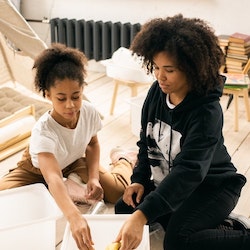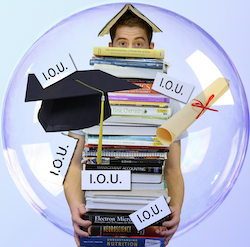Reflective parenting helps parents manage stressful situations with their kids.
KEY POINTS
- Reflection enables parents to be responsive rather than just being reactive to their children.
- Reflective parenting promotes children’s well-being and their achievement.
- Being a reflective parent helps protect children from the negative impact of the stress caused by the Covid pandemic.
- Research shows that reflective parents better help children cope with the stress caused by difficult life situations like the Covid pandemic.
This piece was co-authored by Dr. Regina Pally, a psychiatrist, and founder of the Center for Reflective Communities.
A recent tweet by Conan O’Brien made us smile: “Raising two teenagers is a tough job. Kudos to my assistant.” While clearly a joke, it gets to something big that we all know: Raising teenagers is a tough job. And at no time in recent memory has that job been more complicated than during the COVID-19 pandemic.

We’ve all suffered from the stress of the pandemic. Teenagers most especially have shown an upsurge of depression and anxiety (see ‘It’s Life or Death’: The Mental Health Crisis Among U.S. Teens).
During times like these, it is especially important to keep in mind that teen mental health matters as much, if not more, than achievement. A well-researched approach called reflective parenting provides specific tools that serve as protective factors against the negative impact of stress. These tools also strengthen the parent-teen relationship, promote resilience, and help parents feel less stressed and more confident.
Success Without Well-Being Is Not Worth Having
Quoting the UCLA neuroscientist Alex Korb, “Success without well-being is not worth having.” We take that as our core philosophy when working with parents.
In 1998, a groundbreaking study found that when children suffer long periods of stress it can have a life-long negative impact – including poor health, substance abuse, and impaired school performance. All are caused by a stress system out of control, causing excessive adrenaline and cortisol which are unhealthy for the brain and for the body.
Teens have gone through years of excessive stress from Covid. Fortunately, research has identified certain features of the parent-child relationship that can help.
What is Reflective Parenting?
Reflective capacity is the natural way we make sense of ourselves and each other. When parents are reflective, children do better – emotionally, socially, academically, and physically. It also serves a protective function against the negative impact of too much stress.
Reflective capacity has three core elements:
- Parents and children have separate minds with their own unique perspectives.
- Behavior has meaning and is dictated by what is going on inside our minds.
- Misunderstandings and conflict are normal and common.
Reflective capacity is not a perfect system. When we observe our child’s behavior, we often jump to conclusions. Then we respond to our conclusion, not to the reason why the behavior is happening. And to complicate things further, when we feel an intense emotion, such as sadness, rejection, or embarrassment, we are more likely to respond based on our own feelings than to what is actually going on inside the child.
Stress reduces our reflective capacity. So what can parents do? Slow down, push pause, and reflect on what might be going on inside the child and themselves. When we are reflective, we are better able to recognize mistakes, clarify misunderstandings, and resolve conflicts – all of which are stress-reducing and promote resilience.
Reflective Parenting has countless benefits, including:
- Reducing stress;
- Parents feeling more confident;
- Regulating the child’s emotions;
- Improving self-regulating emotions;
- Children become more cooperative;
- Reducing depression and anxiety.
Parents Play a Crucial Role Helping Teens Who are Experiencing Stress
Stress is caused by anything that is a challenge to cope with. Often, stress is activated by negative emotions such as fear, anxiety, and frustration. Stress also manifests during times of rejection, failure, overwork, unpredictability, and uncertainty. And clearly, stress has been amplified because of Covid.
But stress isn’t always negative. Stress is OK as long as people can calm themselves down from the stress response. In fact, having a stress response followed by a calming down phase is a sign of physical and mental health. It is when stress is prolonged and we don’t recover that problems arise.
This is where parents come in. Even though teenagers act like they don’t need or want parents, we know that deep down they actually depend on parents a lot. They just can’t always let us know about it.
When kids are young, parents do the regulating. But as kids mature, parents can start to teach skills for self-regulation. Self-regulation is crucial for being able to pay attention and learn, pursue tasks in the face of frustration, and manage disappointment without giving up. Self-regulation is the basis for getting along with others and leads to a successful transition from adolescence to adulthood.
Tips for What to Do and What to Say
While there are never simple solutions, the best advice we can offer is fairly simple:
- Be There
- Accept
- Empathize, Validate, Support
- Teach Coping Skills
- Balance Empathy with Coping
Be there. It’s crucial for parents to slow down and reflect on what might be going on inside the child and themselves. Just being present has profound implications. And it’s not possible to truly be present if we are reacting without thinking.
Accept. We can’t change things until we first accept they are happening. Our tendency is to want to change situations we don’t like. Humans hate uncertainty and will twist reality to make it feel more predictable even when it isn’t. But when nature presents us with a situation that is outside our control, like Covid, it causes stress. Acceptance of our fundamental powerlessness in the face of natural forces is calming.
Empathize, Validate, Support. Parents need to let teens know they understand the (sometimes extreme) feelings their teen is experiencing are real and OK. Parents need to support teens as they sit with those feelings. We often want to roll our eyes or tell our teens they are being ridiculous, but we have to recall that parents and children have separate minds with their own unique perspectives. Remember that the teenager is experiencing their feelings and they seem all too real in the moment.
Teach Coping Skills. Teens need help seeing that current situations will not last forever and that the future will be OK. By understanding the temporary nature of what they are experiencing, teens can build the resilience necessary to cope with whatever comes their way without it incapacitating them.
Balance Empathy with Coping. Empathy is calming but too much can happen when a parent over-identifies and experiences as much pain as their child. ‘Over empathy’ can keep a child stuck in the painful feeling. This is why reflective parenting emphasizes the separateness of minds. In other words, it is the child’s pain, not the parent’s. This enables the parent to empathize but still be able to offer coping strategies that would be adaptive for the child.
In Conclusion
Stressful or painful experiences are not in themselves harmful. What is harmful is for a child to lack support for learning how to cope. Sometimes, just being there is enough to help calm a child. Parents cannot fix it. They can only be there and help reduce some of the painful feelings.
By being reflective, parents are much better equipped with the tools necessary to help teens through difficult times. Reflecting can become protecting. But these tools are part of a larger process. Being reflective one time and then reverting to old habits won’t help. Parents need to commit to reflective parenting over time. When they do, the results can be astonishing.


